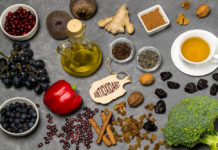Though the foods we choose to eat are digested within, the affect they have on the body can be noticed outward. And when it comes to psoriasis triggers, foods and the nutrients they contain may trigger an internal response with noticeable external features. These 9 foods can affect your psoriasis, either in a positive or negative manner.
What Is Psoriasis?
According to the National Psoriasis Foundation, psoriasis is an immune-mediated disease that causes raised, red, scaly patches to appear on the skin. While it may surface on any part of the body, it tends to affect the elbows, knees, or scalp and causes an itchy, burning, or stinging sensation. And though the condition is often in concordance with health conditions, such as diabetes and heart disease, scientists are still trying to uncover the exact cause. What is known, though, is that psoriasis is affected largely by immune responses and genetics, generally leading to flare-ups following various triggers. And while psoriasis causes are thought to be diverse, they tend to include lifestyle factors and choices.
Psoriasis Diet
A psoriasis diet essentially reduces food shown to cause inflammation. Psoriasis triggers may include the following foods:
1. Fatty Red Meats
While red meat may be consumed in moderation, excessive consumption has shown to cause inflammation within the body. Reducing intakes may lessen psoriatic symptoms as well as heart disease, as people with psoriasis are at a higher risk of its development. Ultimately, limit the consumption of hot dogs, sausage, and other high-fat meats and opt for leaner cuts.
2. Dairy Products
Dairy affects individuals on personal agendas, as some may be diagnosed with lactose intolerance while others may not be affected at all. Despite the disparities, high-fat milk and dairy products are suggested to trigger inflammation within the body and are encouraged to be moderated.
3. Processed and Refined Foods
Highly processed foods may trigger inflammation, especially with the presence of trans fat and sugar most convenience products contain. Additionally, these sort of food sources are merely empty calories and can contribute to weight gain, posing risk of obesity and heightening the risk of various health conditions.
4. Nightshade Vegetables
While veggies are generally never discouraged, nightshade vegetables might be an exception. Nightshades include white potatoes, tomatoes, and peppers and individuals with psoriasis report they exacerbate their symptoms.
5. Alcohol
Despite the evidence that keeps pouring out regarding red wine’s antioxidant content, individuals with psoriasis may benefit from reducing alcohol intake. Especially if using alcohol or cigarettes to cope, practicing alternative stress-relieving techniques is encouraged.
Conversely, the following foods are shown to have anti-inflammatory properties and may affect psoriasis in a positive way:
6. Fatty Fish
Salmon, tuna, and halibut contain omega-3 fatty acids, a type of “healthy” fat, and offers heart-protective and anti-inflammatory properties. Omega-3 fatty acids have also shown to fight against aging and contribute to good skin health.
7. Berries
Especially blueberries and raspberries, berries supply great, if not the greatest, antioxidant properties. Antioxidants combats against inflammation in the body by protecting cells against damage.
8. Carrots
Eating carrots goes beyond eye health, at vitamin A also promotes healthy skin by developing skin cells. Additional sources of vitamin A include cantaloupe, mango, tomatoes, watermelon, and other produce naturally orange and red in color.
9. Herbs
While the verdict is still out, individuals claim the use of herbs lessens psoriatic symptoms. Despite the undetermined link between psoriasis and herbs, they are quite beneficial and offers rich flavors to food without the use of highly refined and processed ingredients.
Along with reducing foods that cause inflammation, an unhealthy weight poses risk for psoriasis and psoriatic arthritis, as fat is an inflammatory tissue. Healthy weight loss can lead to improvements in psoriatic symptoms, as well as reducing the risk of chronic diseases and optimizing quality of life. A healthful diet emphasizes fruits, veggies, whole grains, lean and plant-based based proteins along with healthy fat sources. If needing assistance in achieving a nutritious diet, look no further than Balance by bistroMD!
Reference:
Treating psoriasis: Diet and Nutrition. National Psoriasis Foundation. Available at: https://www.psoriasis.org/about-psoriasis/treatments/alternative/diet-supplements.









